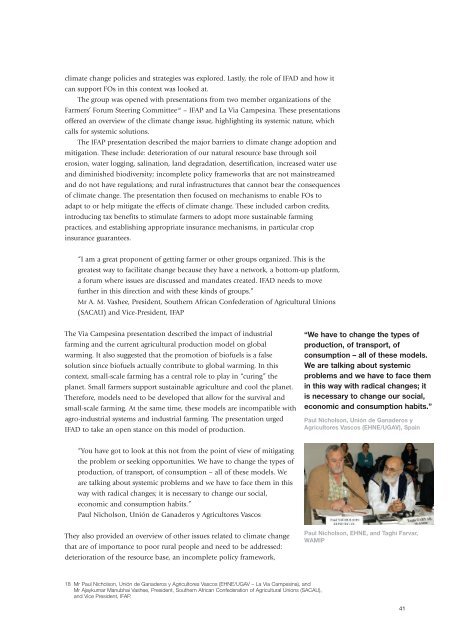Report of the 2008 global meeting - IFAD
Report of the 2008 global meeting - IFAD
Report of the 2008 global meeting - IFAD
You also want an ePaper? Increase the reach of your titles
YUMPU automatically turns print PDFs into web optimized ePapers that Google loves.
climate change policies and strategies was explored. Lastly, <strong>the</strong> role <strong>of</strong> <strong>IFAD</strong> and how it<br />
can support FOs in this context was looked at.<br />
The group was opened with presentations from two member organizations <strong>of</strong> <strong>the</strong><br />
Farmers’ Forum Steering Committee 18 – IFAP and La Via Campesina. These presentations<br />
<strong>of</strong>fered an overview <strong>of</strong> <strong>the</strong> climate change issue, highlighting its systemic nature, which<br />
calls for systemic solutions.<br />
The IFAP presentation described <strong>the</strong> major barriers to climate change adoption and<br />
mitigation. These include: deterioration <strong>of</strong> our natural resource base through soil<br />
erosion, water logging, salination, land degradation, desertification, increased water use<br />
and diminished biodiversity; incomplete policy frameworks that are not mainstreamed<br />
and do not have regulations; and rural infrastructures that cannot bear <strong>the</strong> consequences<br />
<strong>of</strong> climate change. The presentation <strong>the</strong>n focused on mechanisms to enable FOs to<br />
adapt to or help mitigate <strong>the</strong> effects <strong>of</strong> climate change. These included carbon credits,<br />
introducing tax benefits to stimulate farmers to adopt more sustainable farming<br />
practices, and establishing appropriate insurance mechanisms, in particular crop<br />
insurance guarantees.<br />
“I am a great proponent <strong>of</strong> getting farmer or o<strong>the</strong>r groups organized. This is <strong>the</strong><br />
greatest way to facilitate change because <strong>the</strong>y have a network, a bottom-up platform,<br />
a forum where issues are discussed and mandates created. <strong>IFAD</strong> needs to move<br />
fur<strong>the</strong>r in this direction and with <strong>the</strong>se kinds <strong>of</strong> groups.”<br />
Mr A. M. Vashee, President, Sou<strong>the</strong>rn African Confederation <strong>of</strong> Agricultural Unions<br />
(SACAU) and Vice-President, IFAP<br />
The Via Campesina presentation described <strong>the</strong> impact <strong>of</strong> industrial<br />
farming and <strong>the</strong> current agricultural production model on <strong>global</strong><br />
warming. It also suggested that <strong>the</strong> promotion <strong>of</strong> bi<strong>of</strong>uels is a false<br />
solution since bi<strong>of</strong>uels actually contribute to <strong>global</strong> warming. In this<br />
context, small-scale farming has a central role to play in “curing” <strong>the</strong><br />
planet. Small farmers support sustainable agriculture and cool <strong>the</strong> planet.<br />
Therefore, models need to be developed that allow for <strong>the</strong> survival and<br />
small-scale farming. At <strong>the</strong> same time, <strong>the</strong>se models are incompatible with<br />
agro-industrial systems and industrial farming. The presentation urged<br />
<strong>IFAD</strong> to take an open stance on this model <strong>of</strong> production.<br />
“We have to change <strong>the</strong> types <strong>of</strong><br />
production, <strong>of</strong> transport, <strong>of</strong><br />
consumption – all <strong>of</strong> <strong>the</strong>se models.<br />
We are talking about systemic<br />
problems and we have to face <strong>the</strong>m<br />
in this way with radical changes; it<br />
is necessary to change our social,<br />
economic and consumption habits.”<br />
Paul Nicholson, Unión de Ganaderos y<br />
Agricultores Vascos (EHNE/UGAV), Spain<br />
“You have got to look at this not from <strong>the</strong> point <strong>of</strong> view <strong>of</strong> mitigating<br />
<strong>the</strong> problem or seeking opportunities. We have to change <strong>the</strong> types <strong>of</strong><br />
production, <strong>of</strong> transport, <strong>of</strong> consumption – all <strong>of</strong> <strong>the</strong>se models. We<br />
are talking about systemic problems and we have to face <strong>the</strong>m in this<br />
way with radical changes; it is necessary to change our social,<br />
economic and consumption habits.”<br />
Paul Nicholson, Unión de Ganaderos y Agricultores Vascos<br />
They also provided an overview <strong>of</strong> o<strong>the</strong>r issues related to climate change<br />
that are <strong>of</strong> importance to poor rural people and need to be addressed:<br />
deterioration <strong>of</strong> <strong>the</strong> resource base, an incomplete policy framework,<br />
Paul Nicholson, EHNE, and Taghi Farvar,<br />
WAMIP<br />
18 Mr Paul Nicholson, Unión de Ganaderos y Agricultores Vascos (EHNE/UGAV – La Via Campesina), and<br />
Mr Ajaykumar Manubhai Vashee, President, Sou<strong>the</strong>rn African Confederation <strong>of</strong> Agricultural Unions (SACAU),<br />
and Vice President, IFAP.<br />
41

















